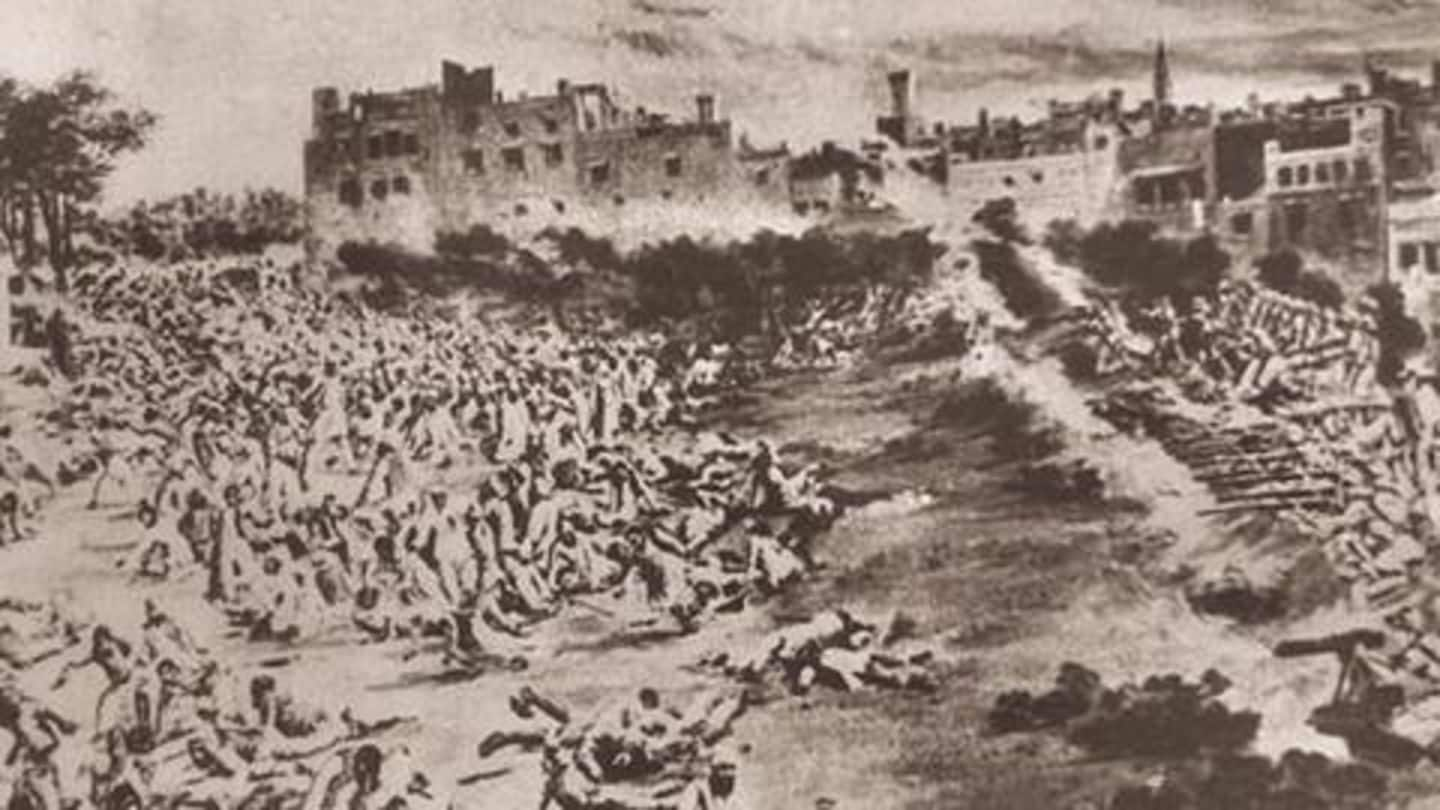
#ThisDayThatYear: Today marks 100 years of Jallianwala Bagh massacre
What's the story
Saturday, April 13, marked the 100th anniversary of Jallianwala Bagh massacre, one of the darkest days of British rule in India in which innocents were killed by a ruthless general.
While London still has to apologize for the heinous act, British High Commissioner to India Dominic Asquith expressed regret over what happened. He laid a wreath in Amritsar, Punjab.
Here's more on this.
History
A peaceful protest turned deadly and changed India's freedom struggle
On this day, exactly a century ago, hundreds of people gathered at Jallianwala Bagh to protest against the arrest of leaders Satya Pal and Saifuddin Kitchlew.
Brigadier-General Reginald Dyer opened fire at the peaceful protesters, turning a deaf ear to their shrieks and cries. As he ordered troops to fire 1,650 rounds, the narrow escape lane was blocked.
Indians claim nearly 1,000 people died.
Apology
UK PM was asked to give an apology, she didn't
The massacre emboldened spirits of India's freedom fighters. The Britishers finally left in 1947, but the scars of Jallianwala Bagh still remain.
On the 100th anniversary of the incident, there were expectations that British PM Theresa May would tender a formal apology. More so because the Labour Party wanted her to give a "full, clear and unequivocal apology".
But May fell short of saying it.
Quote
May called it a "shameful scar" but didn't apologize
"The tragedy of Jallianwala Bagh of 1919 is a shameful scar on British Indian history. As Her Majesty the Queen (Elizabeth II) said before visiting Jallianwala Bagh in 1997, it is a distressing example of our past history with India," said May.
Comment
We regret what happened, wrote Asquith in visitor's book
Asquith's comments in the visitor's book of Jallianwala Bagh followed May's footsteps.
He wrote, "The events of Jallianwala Bagh 100 years ago today reflects a shameful act in British-Indian history. We deeply regret what happened and the suffering caused."
He said he was pleased that India and Britain are committed to building a thriving "21st-century partnership".
Reaction
Amarinder Singh wasn't happy with May's statement
Meanwhile, on Friday, Punjab Chief Minister Captain Amarinder Singh said May's comments were "inadequate".
He said Jallianwala Bagh incident was a heart-wrenching moment in India's history and people want an unequivocal apology. Nothing less than a formal apology would be enough, Singh added.
The Congress leader also pointed out that a resolution in this regard has been passed in Punjab Assembly.
Homage
Leaders remembered the fallen on solemn day
Leaders like Prime Minister Narendra Modi, President Ram Nath Kovind, Union Minister Rajnath Singh, and Congress President Rahul Gandhi remembered the fallen.
PM Modi tweeted that valor and sacrifice of martyrs will not be forgotten. They inspire us to work hard, he added.
Meanwhile, President Kovind tweeted: A horrific massacre, a stain on civilization, that day of sacrifice can never be forgotten by India.
Twitter Post
Nation will remain indebted to martyrs: Rajnath Singh
India today observes the centenary of ghastly Jallianwala Bagh massacre at Amritsar. My heartfelt tributes and homage to everyone who sacrificed their lives at Jallianwala Bagh. Their sacrifice will never be forgotten. The nation will remain indebted to Jallianwala Bagh martyrs.
— Chowkidar Rajnath Singh (@rajnathsingh) April 13, 2019
Rahul's visit
Rahul Gandhi visited Jallianwala Bagh to pay his respects
Notably, Rahul Gandhi went to Amritsar to lay a wreath. He reached Amritsar on Friday night, prayed at the Golden Temple and went to Jallianwala Bagh this morning.
Rahul, who was accompanied by Singh and Congress leader Navjot Singh Sidhu, said the incident changed the course of the Indian freedom struggle.
He added that the price of freedom must not be forgotten.